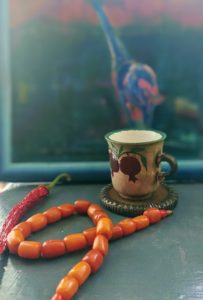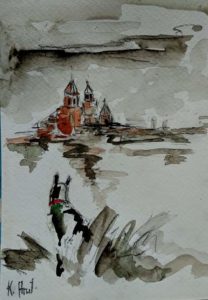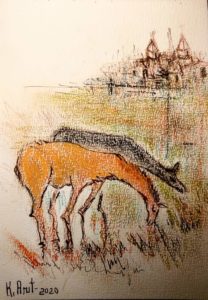
The prayer beads in the far corner of the tallboy drawer belonged to my Armenian grandfather. He passed away one month after his release from a labor camp, in ‘53. We were not destined to meet. My ironic left brow – as far as one can gauge from one of the two badly discolored photographs – comes from Khurshad.
I don’t know the name of my grandfather Khurshad’s grandfather (or his father for that matter). Nor do I know the name of my grandfather Iosef’s grandfather (or his father). Neither of them lived long enough to become a grandfather. And the house I live in is nothing like the one in the saying: “A flimsy foundation is better for a house than none at all…”
***
My father’s father was released from the camps after Stalin’s death, but he was released only to die. My father, who just turned 16, was supporting himself with tutoring. Nobody helped him. Nobody was there to instruct him, to share their experience. But he inherited that horrible experience.
In our house, nobody had to call a spade a spade. Everything was crystal clear as it is. All the meanings were readily discernible – from the pauses, the intervals between words, in the slight movement of an eye or an eyebrow. No didactics, God forbid. A little sarcasm, some subtle irony – and the clay idols collapsed as you watched.
My aunt Lyalechka confessed to me once that she cried when Stalin died.
I was always a crybaby, and everybody was crying… so how could I not?
This was the narrative. The death of the great helmsman. How will we fare without him? Where should we go, what should we do? While little Lyalechka was crying, her face in her palms, my father’s father was still living.
While little Lyalechka was crying, her parents were discussing the momentous event, expressing their take on it to each other.
Their take on it could be expressed in two words – he croaked.
He croaked, thank God, he finally croaked, and nobody knows what happens next.
And next – was life. Great books in new bindings – Kuprin, Meyne Reid, Gogol. Bookshelves all the way to the ceiling. New crepe de chine dress for Lyalechka, who, with God’s help, is all grown up, almost a bride. And a new dress for Milochka as well, she is an orphan, she should not go without.
As Milochka is studying herself in the tall, dark mirror, my father’s first ever tutoring session is in progress. The very first money he will make. He is also an orphan already. Half an orphan, just like her, neither has a living father.
Numerous plots intertwine; together, they weave a kind of pattern. Scrutinizing it, you can study history.
What a great plot it is – how an Armenian boy instantly became “one of us” in a Jewish family. Perhaps, because in this old Kyevan house, nobody has ever seen the need to call a spade a spade. Everything truly important can be conveyed with a look, with an inflexion. There are things that only “one of us” would understand. Within a given plot.
While Iosef, my aunt Lyalya’s dad, was making a toast at the head of a laden table, my father was collecting his thoughts. My father’s toasts were legendary! He could find the most wondrous words! And he knew, like the best actors, how to do a dramatic pause, and you should know, there is nothing as important as a dramatic pause.
The guests around the table exchanged glances, it was clear to them – this Armenian boy, laughing eyes blazing, is “one of us.”
Oh, how many plots there were. Terrible ones, bitter ones, funny ones…
But no more. There are no more plots because everybody who breathed their life and their light into them, is gone.
The plotless future has arrived, and not without warning. Indeed, riders could be seen against the fiery horizon, moving closer with every passing day.
One day, there’ll be no more cherry brandy in the goblet. The departing guests take a long time saying their good-byes. There is so much vibrant life in these faces, so much happiness in just this one evening. I remember the books in our library, the thicket of their bindings. The plate passed across the table.
I will turn around to say good-bye to my parents standing on the balcony. How sick of heart I will suddenly become, how, struck with a terrible premonition, I will turn again and again… They are still there, on the balcony, still waiving.
I remember my parents walking, hand in hand, along a snowy road.
There is almost nobody left who — I can tell by exchanging a quick glance — does not need any explanations. It would be like calling a spade a spade… or explaining a joke.
There are dramatic pauses after all. One needs to know how to do them properly.
***
The prayer beads in my palm are the link with the times torn asunder, of the destroyed lives, abandoned homes, unknown names.
A serendipitous gift from the past. As if – from him. As if, furtively admiring me – the me from yesterday and the me from today – he smiles and says: Karineh-djan. Take these, Karineh-djan, to remember me. To remember the house I was building – for all my children… None of them is alive anymore. Nor am I. But these prayer beads — I got them from my grandfather…
***
I have these prayer beads. I got them from my father.
Smooth coral beads in strong masculine fingers – like sea pebbles – click-clack – it’s a very special kind of music – light clicking, stillness and silence, the smell of sweet animal dung smoke.
The gurgling waters of a mountain stream and every imaginable hue of red – from the hot ochre of the folded cliffs to the drops of crimson in a wild rose bush.
The smell of walls grown hot during the day, the smell of childhood and old age –sun-bleached, dry, and gentle – like the top of a baby’s head or an old man’s palm. And a handful of apricot pits, strewn across the table top. Just a reminder. Click-clack, click-clack…
Karineh Arutyunova (author) has eight books of short stories published in Russia and Ukraine. Her writing has won many prizes, including the Andrei Bely Prize (St. Petersburg), Vladimir Korolenko Prize (Kiev), Ernest Hemingway Prize (Canada), and Mark Aldanov Prize (New York). Born in Kiev, she emigrated to Israel in the early nineties, where she lived until 2009. Currently, Karineh lives and works in Kiev.
Lena Mandel (translator) holds an MA from The Jewish Theological Seminary, an MS from Columbia University (psychology), and a JD from Rutgers University. Now retired from a career as an attorney, she focuses on literary translation. Her translations have appeared in Packingtown Review and Peauxdunque Review.


Четки
Четки, лежащие в дальнем углу комода, принадлежали моему армянскому деду. Его не стало через месяц после освобождения из заключения в 53 году.
Нам не дано было пересечься. Моя поднятая левая бровь(если судить по одному из двух выцветших снимков) – от Хуршуда.
Я не узнаю, как звали деда (и отца) моего деда Хуршуда. Я не знаю, как звали деда (и отца) деда Иосифа. Ни один из них не успел стать дедом. И дом, в котором я живу, ничего общего не имеет с тем, гипотетическим.
“Дом на фундаменте хлипком.
Лучше, чем ничего…”
***
Отец моего отца вышел на свободу после смерти Сталина, но вышел он умирать. Папа, которому исполнилось 16, зарабатывал частными уроками. Ему никто не помогал. Некому было наставлять и делиться опытом. Но опыт этот страшный – перешел к нему по наследству.
В нашем доме не принято было называть масло масляным. Все было предельно ясно. В паузах, в интервалах между словами, по одному движению глаз, бровей. Никакой боже сохрани дидактики. Разве только немного иронии, сарказма, и глиняные идолы острова Пасхи рушились на глазах.
Тетя моя, Лялечка, как-то раз призналась мне, что плакала, когда узнала о смерти Сталина.
-Я была плаксивой девочкой, все плакали, и я тоже…как не заплакать…
Это был такой сюжет. Смерть великого кормчего. Как без него? Куда идти, что делать?
Пока девочка Ляля плакала, закрыв лицо ладонями, отец моего отца еще был жив.
Пока девочка Ляля плакала, родители ее переговаривались между собой, выражая отношение к этому эпохальному событию.
Оно, это отношение, выражалось одним словом, – сдох. Он, не про нас будь сказано, сдох, он слава Всевышнему, сдох, и, кто теперь знает, как будет дальше?
А дальше будет жизнь. Всемирная библиотека в новеньких переплетах. Куприн, Майн-Рид, Гоголь. Книжный шкаф до самого потолка. Новое крепдешиновое платье для Лялечки, которая, слава богу, почти невеста. Новое для Милочки, она сирота, ее нельзя обидеть.
Пока Милочка разглядывает себя в высоком темном зеркале, папа дает первый в своей жизни урок. Его первые заработанные деньги. Он уже сирота, тоже наполовину, как и она, у обоих нет отцов.
Множественные сюжеты, сплетаясь, образуют нечто вроде орнамента. По нему можно изучать историю.
Разве не прекрасна история о том, как армянский мальчик моментально стал своим в еврейской семье. Возможно, благодаря тому, что в доме этом, в старом подольском доме, масло никогда не называли масляным, а солнце солнечным. Все самое главное – в паузах. В интонациях. Есть вещи, которые поймут только свои. В пределах заданного сюжета.
Пока за накрытым столом Иосиф, отец моей тети Ляли, высоко подняв стопку, произносил тост, папа собирался с мыслями. Ах, какие блестящие тосты произносил мой папа! Какие исключительные слова находил! И, как гениальный актер, держал паузу, а пауза в этом деле, если хотите знать, самое главное.
Гости за столом переглядывались. Им все было ясно. Это армянский мальчик с горящими смеющимися глазами – свой.
Ах, сколько же было сюжетов. Страшных, горьких, смешных…
Они закончились. Они закончились, потому что все, кто обживал их изнутри, наполняя дыханием, жизнью, светом, ушли.
Будущее за пределами сюжета наступило не то чтобы молниеносно. Были всадники на огненном горизонте, они, эти всадники, становились ближе с каждым днем.
Однажды закончится густая вишневая наливка в прозрачном кубке.
Гости, прощаясь, долго еще толпятся в прихожей. Сколько кипучей жизни в этих лицах, сколько счастья в один отдельно взятый день. Я помню тома всемирной библиотеки, густоту книжных корешков. Передаваемое через стол блюдо.
Прощаясь со стоящими на балконе стариками, я обернусь. Как защемит в груди, как, задыхаясь от тягостного ощущения, я обернусь еще и еще раз… Они все еще стоят, все еще машут.
Я помню родителей, идущих рука об руку по занесенной снегом дорожке.
Почти не с кем встретиться взглядом, убеждаясь в том, что ближний не нуждается в подробном разъяснении. Это все равно что масло назвать масляным… или пересказать смысл анекдота.
Ведь есть, в конце концов, паузы, их нужно уметь держать.
***
Четки на моей ладони символизируют связь разорванных времен, загубленных жизней. Брошенных домов, неназванных имен.
Неожиданный подарок из прошлого. Как будто от него. Как будто, втайне любуясь мной, вчерашней, сегодняшней, он улыбается и говорит, – Каринэ джан…Возьми, Каринэ джан, на память обо мне. На память о доме, который я строил, – для всех моих детей…Их больше нет на свете. И меня нет. Но эти четки, они достались мне от моего деда…
***
У меня есть четки. Они достались мне от моего отца.
Гладкие коралловые бусы в сильных мужских пальцах, – будто морские камешки, – трак-трак-трак, – это особая музыка, – легкое потрескивание, спокойствие и тишина, и запах сладковатого кизячного дыма.
Журчание вод в горных ущельях и все оттенки красного, – от жаркой охры складчатых скал до алых капель в зарослях дикого шиповника.
Запах нагретых за день стен, запах детства и старости, – немного выгоревший на солнце, сухой и добрый, точно макушка ребенка или ладонь старика. Или горсть абрикосовых косточек, рассыпанных по столу. Просто напоминание. Трик-трак, трик-трак…
Karineh Arutyunova (author) has eight books of short stories published in Russia and Ukraine. Her writing has won many prizes, including the Andrei Bely Prize (St. Petersburg), Vladimir Korolenko Prize (Kiev), Ernest Hemingway Prize (Canada), and Mark Aldanov Prize (New York). Born in Kiev, she emigrated to Israel in the early nineties, where she lived until 2009. Currently, Karineh lives and works in Kiev.
Lena Mandel (translator) holds an MA from The Jewish Theological Seminary, an MS from Columbia University (psychology), and a JD from Rutgers University. Now retired from a career as an attorney, she focuses on literary translation. Her translations have appeared in Packingtown Review and Peauxdunque Review.